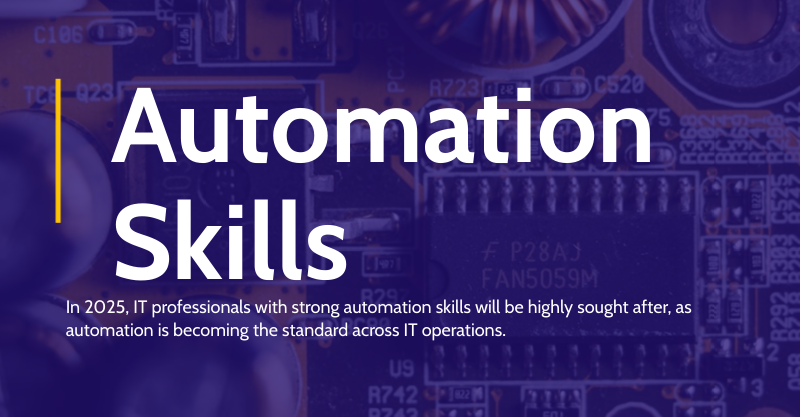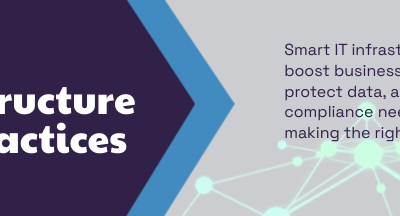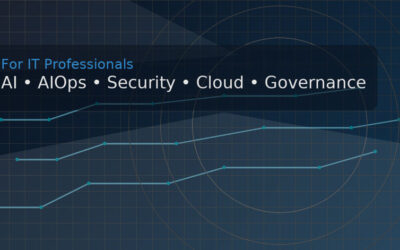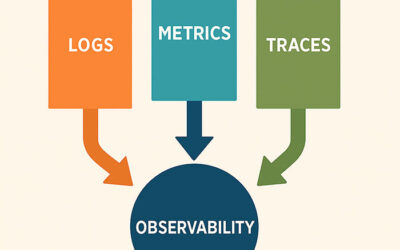Why Automation Skills Are No Longer Optional
In 2025, one thing is abundantly clear: automation in IT is no longer a futuristic concept—it’s the new standard. From DevOps to cybersecurity and cloud computing, automation is reshaping the landscape of modern IT infrastructures. With businesses aiming to optimize workflows, cut operational costs, and scale efficiently, professionals with strong automation skills are in high demand.
The Growing Role of Automation in IT Operations
1. DevOps and CI/CD Pipelines
DevOps continues to thrive on the foundation of automation. In 2025, continuous integration and continuous delivery (CI/CD) pipelines are no longer a luxury—they’re a necessity. Automation tools like Jenkins, GitHub Actions, GitLab CI, and CircleCI help IT teams deploy code faster, more securely, and with fewer errors.
Automation in DevOps:
- Streamlines testing and deployment
- Reduces manual configuration errors
- Enables faster feedback loops
2. Cloud Infrastructure and Infrastructure as Code (IaC)
Cloud environments like AWS, Azure, and Google Cloud are complex, requiring scalable solutions for provisioning, configuration, and monitoring. Tools such as Terraform, Ansible, and Pulumi allow developers and operations teams to define infrastructure using code, a practice known as Infrastructure as Code (IaC).
This shift is leading to:
- Greater consistency in environments
- Quicker recovery from failures
- Automated scaling and resource optimization
3. Security Automation
In an age of escalating cyber threats, security automation is essential. Automated security scanning tools, threat detection systems, and AI-driven monitoring allow IT teams to catch vulnerabilities before they become breaches.
Security automation benefits:
- Real-time incident response
- Automated patch management
- Enhanced compliance reporting
Why Automation Skills Are Crucial in IT
The Skills Gap Is Widening
Despite the growing reliance on automation tools, many IT professionals still lack the hands-on expertise required to operate them efficiently. According to industry surveys, automation remains one of the top skill gaps in IT, especially in roles involving cloud, DevOps, and security.
Organizations that don’t invest in automation skills training may find themselves:
- Lagging behind more agile competitors
- Overburdening staff with manual tasks
- Exposing themselves to operational risks
Job Roles Are Evolving
In 2025, many traditional IT roles are blending or shifting altogether. For example:
- System administrators are becoming automation engineers
- Network engineers are expected to script and automate workflows
- Cybersecurity analysts now require automation for threat intelligence and incident response
Mastering automation not only ensures career longevity but also opens the door to new, high-paying roles like site reliability engineers (SREs) and DevSecOps specialists.
High-Demand Automation Tools and Technologies
Here are some of the most in-demand tools and frameworks for automation in 2025:
| Category | Tool | Description |
| CI/CD | Jenkins, GitHub Actions | Automate code build, test, and deployment |
| IaC | Terraform, Pulumi, Ansible | Automate infrastructure provisioning |
| Containers | Docker, Kubernetes | Automate app deployment and scaling |
| Monitoring | Prometheus, Grafana, ELK Stack | Automate observability and alerting |
| Security | CrowdStrike, Splunk, Snyk | Automate threat detection and remediation |
| Scripting | Python, Bash, PowerShell | Foundation for all automation logic |
How Automation Maximizes IT Efficiency
Reduced Human Error
One of the biggest benefits of automation is its ability to eliminate human error from repetitive tasks. Whether it’s deploying applications, configuring servers, or managing databases, automation ensures that the same process runs consistently every time.
Examples of reduced errors through automation:
- Scripted deployments prevent missed steps or misconfigured environments
- Scheduled patch management removes the need for manual updates
- Automated testing catches bugs before they reach production
This reliability becomes critical in industries like healthcare, finance, and e-commerce, where uptime and accuracy are non-negotiable.
Time Savings and Faster Turnaround
Automating mundane tasks like provisioning virtual machines, syncing data, or managing logs saves IT teams countless hours. The result? Faster turnaround for projects, quicker issue resolution, and more time to focus on innovation rather than firefighting.
Tasks that can be streamlined:
- Onboarding new developers with pre-configured environments
- Backing up databases automatically based on a set schedule
- Rolling out software updates across distributed systems in minutes
Real-World Impact: Companies Thriving Through Automation
Let’s look at how leading companies are leveraging automation skills to improve operations and outpace competitors.
Netflix: Scaling with DevOps and Chaos Engineering
Netflix operates one of the most complex cloud infrastructures in the world. Its engineers use automation tools to deploy microservices, manage environments, and simulate failures—yes, failures—on purpose. This practice, known as chaos engineering, ensures their systems are resilient under pressure.
Automation highlights:
- Continuous delivery pipelines using Spinnaker and Jenkins
- Automated canary testing for safe deployments
- Self-healing systems that auto-recover from failures
Spotify: Automating Developer Experience
Spotify has invested heavily in automating its internal developer platform. Engineers can spin up test environments, deploy to production, and manage dependencies with minimal manual intervention—all through intuitive interfaces backed by automation scripts.
Key tools used:
- Backstage (internal developer portal)
- Kubernetes for automated container orchestration
- Terraform for cloud infrastructure management
Capital One: Leading with Security Automation
As one of the first major banks to move fully to the cloud, Capital One uses automation-first strategies to maintain security compliance and operational excellence.
Their approach includes:
- Continuous compliance through IaC templates
- Real-time threat detection with AI-enhanced monitoring
- Automated rollback and recovery protocols
These examples illustrate why automation skills are not just “nice to have”—they’re mission-critical.
Top Automation Skills IT Pros Should Master
To stay competitive and future-proof your career, these are the top automation skills worth developing:
1. Scripting Languages
Scripting is the backbone of most automation tasks. Learn at least one of the following:
- Python – Great for cross-platform automation, APIs, data parsing
- Bash – Essential for Linux/Unix environments
- PowerShell – Must-know for Windows automation
2. Infrastructure as Code (IaC)
IaC is revolutionizing how infrastructure is managed. Focus on tools like:
- Terraform – Cloud-agnostic infrastructure automation
- Pulumi – IaC using familiar programming languages
- Ansible – Agentless automation for provisioning and config
3. CI/CD Pipelines
Understanding CI/CD is essential for roles in DevOps, development, or QA:
- Learn Git workflows and branching strategies
- Set up pipelines using GitHub Actions, Jenkins, or GitLab CI
- Incorporate automated testing and linting tools
4. Containerization and Orchestration
Containers streamline deployment. Skills to acquire:
- Docker – Containerizing apps and managing images
- Kubernetes – Automating scaling, health checks, and load balancing
- Helm charts, service meshes, and custom controllers
5. Monitoring and Logging
Observability is often automated for proactive insights:
- Set up dashboards in Grafana or Kibana
- Use Prometheus to collect real-time metrics
- Automate alerts for anomalies or threshold breaches
How to Start Learning Automation Today
Getting into automation doesn’t require a full career pivot—just consistent practice and exposure.
Practical Tips:
- Automate personal tasks: Try writing a script that automates file organization, task reminders, or server health checks.
- Contribute to open-source IaC projects: Explore repositories using Terraform or Ansible.
- Build a home lab: Use tools like Vagrant and Docker Compose to simulate real-world deployments.
Certifications Worth Considering
Investing in a certification can help validate your expertise:
- HashiCorp Certified: Terraform Associate
- Certified Kubernetes Administrator (CKA)
- AWS Certified DevOps Engineer
- Microsoft Certified: DevOps Engineer Expert
How Automation and AI Are Intertwining
Automation and AI are no longer separate paths—they’re converging fast.
AI-Augmented Automation
Tools like GitHub Copilot and ChatGPT are accelerating the way engineers write scripts, troubleshoot, and even architect automation pipelines.
Examples:
- AI-powered code generation for deployment scripts
- Predictive analytics for resource scaling
- Smart alerting systems that prioritize issues based on impact
Autonomous IT Operations (AIOps)
AIOps blends machine learning and automation to create intelligent IT systems that can self-monitor, self-heal, and optimize operations without human input.
Impact areas:
- Incident resolution through auto-remediation scripts
- Log correlation and root cause analysis
- Predictive maintenance and infrastructure optimization
Challenges and Considerations in Automation Adoption
While the benefits of automation are massive, there are challenges to consider:
Tool Overload
With so many tools available, choosing the right one can be overwhelming. The key is to:
- Standardize toolsets across teams
- Choose tools that integrate well with existing workflows
- Avoid the “shiny object” syndrome
Security Risks
Poorly configured automation scripts can introduce vulnerabilities. Always:
- Secure credentials using secrets managers
- Validate scripts with peer reviews
- Maintain version control and logging for audits
Team Training
Automation is a team sport. Make sure your team:
- Has time to upskill through courses and labs
- Collaborates on building shared libraries and templates
- Establishes clear standards and documentation
Automation as the New IT Literacy
In the same way that basic programming became essential for many IT roles, automation is the new baseline. Whether you’re a sysadmin, network engineer, cloud architect, or cybersecurity analyst, automation skills will define your effectiveness and relevance in 2025.
Organizations that cultivate automation expertise are:
- More agile and competitive
- Better at attracting top tech talent
- Positioned to scale sustainably in a digital-first economy
IT professionals who embrace automation are:
- More valuable in the job market
- More efficient in delivering impact
- Positioned to lead the next era of innovation









